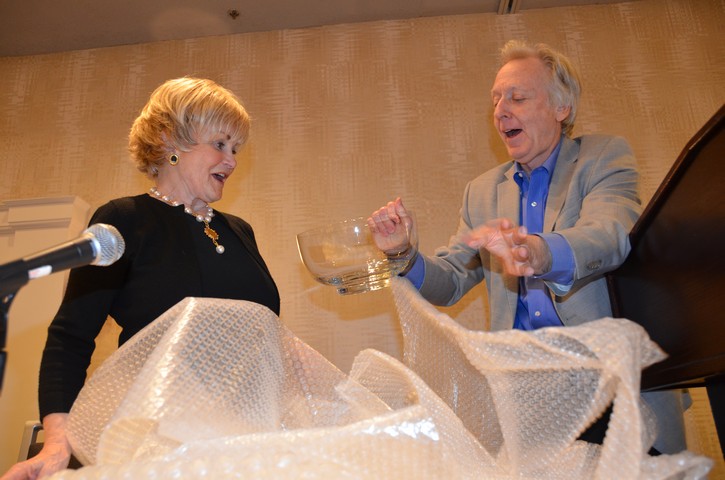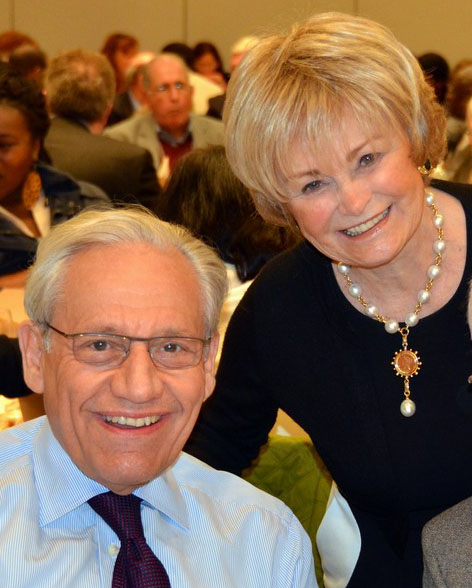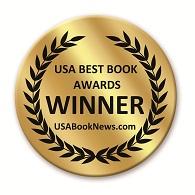Awards
BIO Award Winner Kitty Kelley’s Speech
Kitty Kelley won the 2023 Biographers International Organization Award. On Saturday, May 20, at the 2023 BIO Conference, it was also announced that Kelley will make a gift of $1 million to BIO, to be given over the course of five years. You can read more about that here.
The following is Kitty’s keynote address:

If I get run over tonight, please make sure that this BIO award leads my obit, because it’ll be the only time that my name shares the same space with Ron Chernow and Robert Caro and Stacy Schiff. But I don’t want to think about obituaries right now. I want to share with you a little bit about the writing life that brings me here today.
I love books and as much as I enjoy fiction, I bend my knee to nonfiction, particularly biography—the art of telling a life story. All kinds of life stories—memoir, authorized and unauthorized biography, historical narrative, or contemporary profiles.
In the last few decades, I’ve written biographies about living icons, a genre that is sometimes dismissed as “unauthorized biography” and, unfortunately, the term is sometimes said as if you’re emptying a bedpan or cleaning up the dog’s mess. Unauthorized biographies are not approved by everyone and rarely appreciated by their subjects. One exception, of course, is the New Testament, which was written by disciples who never knew their subject.
About 40 years ago, I thought I’d died and gone to biography heaven when Bantam Books offered me a grand advance to write the unauthorized biography of Frank Sinatra. I’d written two previous biographies and been robbed on both. On the first one, I didn’t have an agent—which is like driving a car without a steering wheel. On the second, I had an agent straight out of Oliver Twist. You may remember the woman who advised Linda Tripp to advise Monica Lewinsky to save her blue dress. Well, that same woman was once a literary agent who caused about $70,000 in foreign sales to go missing on my Elizabeth Taylor biography. My lawyer was incensed and insisted I sue. I told him to write the agent, say I’d misplaced records, and ask for another accounting. I figured that way she could correct herself and repay the missing monies.
I’m embarrassed to admit that I let this go on for over a year because I just couldn’t believe a literary agent would steal from a client. My lawyer said, “Try to get it into your fat head: She’s not Max Perkins. She’s Ma Barker.”
After 17 months, I finally filed suit. Depositions were taken and the case went to federal court in Washington, D.C. I fully expected her to settle because the evidence was so overwhelming. Instead, the case went to trial and the jury found Ma Barker guilty on all six counts, including fraud. They demanded she make payment on the courthouse steps and even asked for punitive damages.
I suppose the lawsuit was a great victory, because I unloaded a bad agent and got a good one, but I was in no hurry to do another biography. I’d just learned the hard way that there’s no education in the second kick of a mule. I’d undertaken the Elizabeth Taylor biography, hoping to write about the Hollywood studio system that had shaped our fantasies for most of the 20th century. I envisioned weaving that theme into the life story of Elizabeth Taylor, who grew up as a little girl at MGM, and went to school at MGM and . . . married many MGM men. But my plan for this historical narrative soon got buried in Ms. Taylor’s Technicolor life of husbands and hospitals and jewelry stores.
My agent asked, if I were to consider writing another life story, who would be of interest? I said, “Well, the gold ring on the merry-go-round would be Frank Sinatra, because no one’s really done it, and he epitomizes the American dream.” She agreed and that was the end of the subject until a couple weeks later when she called and said she had a generous offer from Bantam Books.
Soon I was back in the biography business, thinking I’d paid my hard luck dues. I’d had a bandit publisher on my first book and a thieving agent on my second. Now was third time lucky. And for a few weeks it was . . . until I was served a subpoena from Frank Sinatra, announcing that he was suing me for $2 million dollars for usurping the rights to his life story. He claimed that he and he alone (or someone he authorized) was entitled to write his life story, and I certainly had not been authorized.
I immediately called my publisher, and Bantam’s legal counsel informed me that I was on my own. “Mr. Sinatra has not sued us,” she said. “He’s sued you, and since you’ve not given us a manuscript, we’re not involved. So, I’d advise you to get legal counsel in California, which is where you’ve been sued and do keep us informed.”
“But I haven’t written a word. I’ve only just begun. My manuscript is years away.”
“We’ll talk then,” she said, before hanging up.
Now, getting sued by a billionaire with Mafia ties concentrates the mind, especially after your publisher leaves the scene. I called my friend, the president of Washington Independent Writers, to commiserate. “I wish we could help you, Kitty, but we’re almost broke,” she said. I assured her that I wasn’t looking for money—just moral support. “Well, in that case, let me get on the horn.” She contacted several writers’ groups, including the Authors Guild and PEN and the American Society of Journalists and Authors, and Sigma Delta Chi, and the National Writers Union. Days later, they held a press conference at the National Press Club in Washington, D.C., to denounce Sinatra for using his power and influence to intimidate a writer before she’d written a word. They denounced his lawsuit and his assault on the First Amendment. As journalists, they understood what was at stake if Sinatra prevailed.
I retained the law firm of O’Melveny and Myers in Los Angeles and tried to keep working on the book, but was interrupted a few weeks later when I was in New York doing interviews and my lawyer called to tell me to get back to D.C. because the LA lawyers were coming to Washington for a meeting that would also be attended by my publisher. The LA lawyers said they’d received a tape recording from Sinatra’s lawyers of me supposedly misrepresenting myself as Sinatra’s authorized biographer, and this tape recording was the proof that they were going to present in court.
Now I was scared, even though I knew I hadn’t made such a telephone call. But I began to second-guess myself, wondering if maybe under the pressure I’d snapped my cap. By the time the lawyers arrived that Monday morning I was ready for handcuffs.
Three teams of lawyers sat down in my living room and put the tape in the recorder. No one said a word for the first two minutes because what we heard sounded like Porky Pig flying high on helium. In a squeaky voice, Porky said he was me and Frank Sinatra told me to call for an interview. The lawyers played that tape three times and we all listened to Porky Pig again and again before anyone said a word. Then all the lawyers laughed, clearly relieved, knowing the tape was a phony. I didn’t laugh.
“This lawsuit has gone on for almost a year and now someone is willing to lie under oath to say that I misrepresented myself to get an interview.”
“Don’t worry. We’ll send this to the tape labs at U.S.C., they’ll send the report to Sinatra’s team, and we’ll file for a dismissal. Meantime, just tape all your interviews.”
I tried to explain to the lawyers that you couldn’t always tape interviews, especially in the early 1980’s, when the technology wasn’t sophisticated. Taping in restaurants was difficult over the clinking of glasses, and taping phone interviews wasn’t legal in every state, even with two-party permission.
I finally decided that the best way to protect myself was to write a thank-you note to everyone I interviewed. That turned out to be 800 notes. They were polite and also protective. I’d thank them for the time they gave me in their home or their office or their favorite bar—wherever we’d done the interview; I’d compliment them on the polka dot bow tie they wore or the pretty pink blouse or their red tennis shoes; I’d mention the fabulous décor, or a particular piece of art, or our great salad in such-and-such a restaurant—any detail that set the time or place. Then I’d send it off and keep a copy in my files, because three or four years later when the book was finally published, they might very well have forgotten that interview or, more likely, wish they had.
That happened with Frank Sinatra Jr. He’d agreed to be interviewed when he was performing in Washington, D.C. His representative asked if I’d be bringing a camera crew, and I said no crew, just a still photographer. Then I quickly called my friend Stanley Tretick, one of President Kennedy’s favorite photographers who had worked for UPI and then LOOK magazine.
Stanley and I arrived at the Capitol Hill Hilton in the afternoon and went to Sinatra’s suite. His publicist met us and then disappeared when Frank Jr. entered the room. Sinatra’s only son sat down and asked me to sit close to him because he didn’t want to strain his voice. He was performing that night. So, I moved over, notebook in hand. The first 30 minutes of the interview went well as Sinatra Jr. talked about accompanying his father on tour and hanging out in Vegas with his father’s friends. Then he leaned over and said, “Hon, I know what happened to Jimmy Hoffa.”
I didn’t move. Because no one knew what happened to Jimmy Hoffa. They knew he was dead, but they didn’t know how or by whom. And now the son of a mob-connected man was going to tell me.
For a split second I wondered what I should wear when I got the Pulitzer Prize.
Just as Frank Sinatra Jr. leaned over to whisper in my ear, Stanley dropped his camera bags on the floor, and said, “Well out with it, man. What the hell happened to Hoffa?”
Frank Sinatra Jr. reared back as if he’d been clubbed. He looked at me, then he bolted from his chair and ran into the bedroom, slamming the door. His publicist came running out and said we had to leave. I begged for more time, saying the interview wasn’t finished, but the publicist was physically pushing us out the door.
Up to that point, Stanley Tretick had been one of my closest friends. Now I looked at him as if he’d just been possessed by the Tasmanian devil.
“Aw, hell. He doesn’t know what happened to Jimmy Hoffa.”
“Really?” I said. “And since when are photographers clairvoyant? And what kind of a lunkhead photographer throws a hissy in the middle of a reporter’s interview? Did it ever occur to you that what the son of a mob-connected man has to say about the disappearance of Jimmy Hoffa might be of interest?”
By now I was down the steps and storming the street to hail a cab. I refused to ride in the same car with a crazy person when I was homicidal. I didn’t speak to Stanley for some time, but he became my best pal again when the Sinatra biography was published. By then Frank Sinatra had dropped his lawsuit but his son now decided to sue, denying he’d ever given me an interview. His lawyers contacted my publisher and everyone braced for another lawsuit. But Stanley produced one of the photos he’d taken during our interview that showed me sitting next to Frank Sinatra Jr. with a notebook in [my] hand and a tape recorder on the table.
That photograph certainly trumped all of my little thank-you notes. Yet I can’t tell you how many times those notes saved me. When I wrote the Nancy Reagan biography, letters rained down on Simon & Schuster from corporate tycoons and all manner of political operatives, who took offense with the words attributed to them or to their wives or secretaries or associates, and at the bottom of every letter was a “cc” to President Ronald Reagan. Each time the publisher’s lawyer would call me to go over my notes and my tapes, and then he’d send a courteous reply, saying the publisher stands by the book and its accuracy.
At first, I wanted the publisher to “cc: President Reagan” just like all the letter writers had done, but the lawyer said no reason to stir the beast. “Those are weasel letters. They’re sent simply to show the flag.” He was right, and there were no retractions and no lawsuits.
That controversial biography became the cover of Time, Newsweek, People, Entertainment Weekly, and The Columbia Journalism Review, and [was] presented on the front pages of The New York Times, The New York Post, and the New York Daily News.
On the day of publication, President and Mrs. Reagan held a press conference to denounce the book, saying that I had—quote—“clearly exceeded the bounds of decency.” And three days later, President Richard Nixon agreed. President Nixon wrote a letter to President Reagan to commiserate. President Reagan responded, saying that everyone he knew had denied talking to the author. Reagan even named the minister of his church, who’d been cited as a source, and the minister had written a denial to all his parishioners in the Bel Air Presbyterian Church bulletin.
Now, I really tried not to respond to every accusation, but this one from a man of the cloth got to me, and I wrote to remind him of the 45 minute interview he’d given in his office. I enclosed a transcript of his taped remarks and asked him to please send around another church bulletin—with a correction. Of course, he didn’t, which proves the wisdom of Winston Churchill, who said that a lie flies halfway around the world before the truth gets its pants on.
Having rankled President Reagan and President Nixon, I later rattled President George Herbert Walker Bush. I’d written to him as a matter of courtesy, when I was under contract to Doubleday to write a historical retrospective of the Bush family, and said I’d appreciate an interview sometime at his convenience.
President Bush never responded to me but he directed his aide to write my publisher, saying:
“President Bush has asked me to say that he and his family are not going to cooperate with this book because the author wrote a book about Nancy Reagan that made Mrs. Reagan unhappy.” First Lady Barbara Bush had been so incensed when she saw my books displayed in the First Ladies Exhibit at the Smithsonian that she directed the curator to remove the display, which he did the next day. In fact, I might not have known about it had I not taken my niece to the Smithsonian a few weeks before and we’d seen the display and took a picture of it.
That photograph now hangs in my guest bathroom next to autographed cartoons from Jules Feiffer and Garry Trudeau. Over the years, that loo has become crowded with cartoons from all of my various books. My sister was very impressed when she saw them. She said to my husband, “I think it’s great that Kitty has put up all the bad ones.” My husband said, “There were no good ones.”
My biography on the Bush family dynasty was published in 2004, in the midst of a contentious presidential campaign. Bush Jr. was running for a second term, and I was lambasted by his White House press secretary, the White House deputy press secretary, the White House communications director, the Republican National Committee, and the house majority leader, Tom DeLay. Mr. DeLay even wrote a colorful letter to my publisher, saying that I was—quote—“in the advanced stage of a pathological career” and the publisher was in—quote—“moral collapse for publishing such a scandalous enterprise.”
When the Bush book became number one on the New York Times bestseller list, I was dropped from the masthead of The Washingtonian Magazine, where I’d been a contributing editor for 30 years. The new owner of the magazine was a Bush presidential appointee. The editor told me, “Your book was too personal. Too revealing.”
“But that’s what a biography is,” I said. “It’s an intimate examination of a person in his times, and in this case a powerful person in the public arena. The President of the United States influences our society, with actions that affect our lives.”
I quoted the actor Melvyn Douglas from the movie Hud. He talked about the mesmerizing power of a public image: “Little by little the look of the country changes because of the men we admire.” And Colum McCann, in his novel Let the Great World Spin, wrote: “Repeated lies become history, but they don’t necessarily become the truth.”
This is why biography is so vital to a healthy society. Whether authorized or unauthorized, biography presents a life story—sometimes it’s an x-ray of a manufactured image, sometimes it’s a gauzy bandage. The best biographers try to penetrate dross and drill for gold. As President Kennedy said, “The great enemy of the truth is very often not the lie—deliberate, contrived and dishonest—but the myth, persistent, persuasive, and unrealistic.”
I do not relish living in a world where information is authorized, sanitized, and homogenized. I read banned books. I applaud whistleblowers and I reject any suppression by church or state. To me, the unauthorized biography, which requires a combination of scholarly research and investigative reporting, is best directed at those figures still alive and able to defend themselves, who exercise power over our lives. . . . I firmly believe that unauthorized biography can be a public service and a boon to history.
The most solid support I’ve received over the years has come from writers—journalists and historians and biographers—who believe in the First Amendment. Who champion the public’s right to know.
These are principles that feed my soul and fill my heart, which is why I’m so grateful to be honored by you today with this award.
Thank you.
Kitty Kelley Wins 2023 BIO Award
Kitty Kelley has won the 14th BIO Award, bestowed annually by the Biographers International Organization to a distinguished colleague who has made major contributions to the advancement of the art and craft of biography.
Widely regarded as the foremost expert and author of unauthorized biography, Kelley has displayed courage and deftness in writing unvarnished accounts of some of the most powerful figures in politics, media, and popular culture. Of her art and craft, Kelley said, in American Scholar, “I do not relish living in a world where information is authorized, sanitized, and homogenized. I read banned books, I applaud whistleblowers, and I reject any suppression by church or state. To me, the unauthorized biography, which requires a combination of scholarly research and investigative reporting, is best directed at those figures still alive and able to defend themselves, who exercise power over our lives. . . . I firmly believe that unauthorized biography can be a public service and a boon to history.”
Among other awards, Kelley was the recipient of: the 2005 PEN Oakland/Gary Webb Anti-Censorship Award; the 2014 Founders’ Award for Career Achievement, given by the American Society of Journalists and Authors; and, in 2016, a Lifetime Achievement Award, given by The Washington Independent Review of Books. Her impressive list of lectures and presentations includes: leading a winning debate team in 1993, at the University of Oxford, under the premise “This House Believes That Men Are Still More Equal Than Women;” and, in 1998, a lecture at the Harvard Kennedy School for Government on the subject “Public Figures: Are Their Private Lives Fair Game for the Press?” In addition, Kelley was named by Vanity Fair to its Hall of Fame as part of the “Media Decade” and she has been a New York Times bestseller multiple times.
For over 30 years, Kelley has been a full-time freelance writer. In addition to the American Scholar, her writing has appeared in The Washington Post, The Wall Street Journal, The New York Times, Newsweek, Ladies’ Home Journal, The Chicago Tribune, The Washington Times, The New Republic, and McCall’s. She is also a frequent contributor to The Washington Independent Review of Books.
Heather Clark, chair of the BIO Awards Committee, said: “The Awards committee is thrilled to recognize Kitty Kelley for her outstanding contributions to biography over nearly six decades. We admire her courage in speaking truth to power, and her determination to forge ahead with the story in the face of opposition from the powerful figures she holds accountable. The committee would also like to recognize Kitty’s many years of service to BIO, especially her fundraising prowess and commitment to growing BIO’s membership ranks. Kitty is a force of nature and a deeply inspiring figure who deserves the highest recognition from BIO for her contributions to advancing the art and craft of biography.”
Of her award, Kelley said, “I’m dazzled by the BIO honor and feel like Cinderella when the glass slipper fit. Please don’t wake me up from this dream.”
Previous BIO Award winners are Megan Marshall, David Levering Lewis, Hermione Lee, James McGrath Morris, Richard Holmes, Candice Millard, Claire Tomalin, Taylor Branch, Stacy Schiff, Ron Chernow, Arnold Rampersad, Robert Caro, and Jean Strouse.
Kelley will give the keynote address at the 2023 BIO Conference, on Saturday, May 20.
2023 BIO Award Winner Kitty Kelley interviewed by Heath Hardage Lee, March 28, 2023
“Martin’s Dream Day” Chosen for ILA Teachers’ Choices Reading List
 The International Literacy Association (ILA) on May 1, 2018 announced the winning titles of the 2018 Choices reading lists: an annual selection of outstanding new children’s and young adults’ books, curated by students and educators themselves. These lists are issued during Children’s Book Week each year.
The International Literacy Association (ILA) on May 1, 2018 announced the winning titles of the 2018 Choices reading lists: an annual selection of outstanding new children’s and young adults’ books, curated by students and educators themselves. These lists are issued during Children’s Book Week each year.
This year, Martin’s Dream Day by Kitty Kelley was included as a Teachers’ Choice for Intermediate Readers (ages 8-11).
Each year, thousands of children, young adults, and educators around the United States select their favorite recently published books for the International Literacy Association’s Choices reading lists. These lists are used in classrooms, libraries, and homes to help readers of all ages find books they will enjoy.
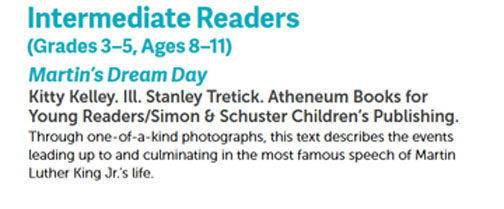 The International Literacy Association (ILA) is a global advocacy and membership organization dedicated to advancing literacy for all through its network of more than 300,000 literacy educators, researchers and experts across 78 countries. With over 60 years of experience, ILA has set the standard for how literacy is defined, taught and evaluated. ILA collaborates with partners across the world to develop, gather and disseminate high-quality resources, best practices and cutting-edge research to empower educators, inspire students and inform policymakers. ILA publishes The Reading Teacher, Journal of Adolescent & Adult Literacy and Reading Research Quarterly.
The International Literacy Association (ILA) is a global advocacy and membership organization dedicated to advancing literacy for all through its network of more than 300,000 literacy educators, researchers and experts across 78 countries. With over 60 years of experience, ILA has set the standard for how literacy is defined, taught and evaluated. ILA collaborates with partners across the world to develop, gather and disseminate high-quality resources, best practices and cutting-edge research to empower educators, inspire students and inform policymakers. ILA publishes The Reading Teacher, Journal of Adolescent & Adult Literacy and Reading Research Quarterly.
“Martin’s Dream Day” is Woodson Honor Winner

National Council for the Social Studies “established the Carter G. Woodson Book Awards for the most distinguished books appropriate for young readers that depict ethnicity in the United States. First presented in 1974, this award is intended to ‘encourage the writing, publishing, and dissemination of outstanding social studies books for young readers that treat topics related to ethnic minorities and race relations sensitively and accurately.’”
2018
Elementary Level Honoree
Martin’s Dream Day
by Kitty Kelley
Atheneum Books for Young Readers
Certificate of Special Congressional Recognition
Jamie Raskin, Member of Congress. presented Kitty Kelley in April 2017 with a Certificate of Special Recognition for “Your Irrepressible Journalism and Irresistible Analysis of the Private Lives of Public Figures.”

Kitty Kelley to Headline JCA Dinner
Kitty Kelley is this year’s honoree at The Jewish Council for the Aging’s 24th annual Sylvia Blajwas Productive Aging Award Dinner, which will be held Sunday, May 21, 2017 at the North Bethesda Marriott Hotel and Conference Center.
There will be cocktails, hors d’oeuvres and a silent auction, starting at 5:30 p.m.
Previous honorees have included Sam Waterston, Alan and Arlene Alda, Sally Quinn, Doris Kearns Goodwin and Richard Goodwin, Edgar Bronfman Sr., Cokie and Steve Roberts, Phyllis Richman, Judith Viorst, Phil Donahue, Daniel Schorr, Robert Prosky, Eli Wallach and Anne Jackson, Jerry Stiller and Anne Meara, Ruby Dee and Ossie Davis, Eunice and Sargent Shriver, Roberta Peters, Gwen Verdon, Mike Wallace, Al Hirschfeld, Dr. C. Everett Koop, Katharine Graham, and The Honorable Louis Goldstein, Comptroller of the State of Maryland.
The Jewish Council for the Aging is the leading aging agency in the Greater Washington D.C. area.
Washington Independent Review Lifetime Achievement Award
Kitty Kelley received the 2016 Lifetime Achievement Award from the Washington Independent Review of Books. The award was presented at the 4th annual “Books Alive!” Washington Writers Conference on April 30, 2016. The following are her remarks.
For the last 40 years I’ve chosen to write biographies of people who are alive and influence our world. I’ve done this without their cooperation and independent of their demands and dictates. These people are not simply celebrities, but titans of society who have affected us as individuals and left an imprint on our culture, sometimes for better, sometimes for worse.
With each biography, the challenge has been to answer the question John F. Kennedy once posed: “What makes journalism so fascinating and biography so interesting is the struggle to answer that single question: ‘What’s he like?’”
I believe that the best way to find out is to tell a life story from the outside looking in, and so I choose to write with my nose pressed against the window rather than kneeling inside for spoon feedings.
Championing the independent or unauthorized biography might sound like a high-minded defense for a low-level pursuit, but I do not relish living in a world where information is authorized, sanitized and homogenized. I read banned books. I applaud whistleblowers. I reject any suppression by church or state. And I believe in freedom of the press. To me the unauthorized biography, which requires a combination of scholarly research and investigative reporting, is best directed at those figures, still alive, who exercise power over our lives.
In writing about contemporary figures, I’ve found that the unauthorized biography avoids the pureed truths of revisionist history, which is the pitfall of an authorized biography. Without being beholden to the subject or bending to editorial control, the unauthorized biographer is better able to penetrate the manufactured public image. For, to quote President Kennedy again, “The great enemy of the truth is very often not the lie—deliberate, contrived and dishonest—but the myth—persistent, persuasive and unrealistic.”
Despite my lofty defense of the unauthorized biography there’s no question that it exacts a price. The authorized biographer is often hailed as a white knight while the unauthorized biographer is usually demonized. It’s the difference between poodles and pit bulls. One is adored—the other avoided. Authorized biographers are like seraphim—the angels who stand to give praise. Unauthorized biographers are like what John Boehner recently called Ted Cruz. You can understand why I keep an old cowboy motto above my desk that says—“Tell the truth but ride a fast horse.”
I still dream about going to the same heaven as authorized biographers but I’m probably headed for whatever awaits the unanointed. I’m afraid I’ve toiled too long on the unauthorized side of the street to ever hear the angels sing. But this award for telling the truth and riding a fast horse will keep me galloping forward —with great pride.
Thank you very much.
(All photos by Bruce Guthrie.)
David O. Stewart, president and chair of the board, presented the award to Kitty Kelley.
Kitty Kelley with keynote speaker Bob Woodward.
Statement, ASJA Awards Presentation, April 24, 2014
On April 24, 2014, Kitty Kelley was presented with the Founders’ Award for Career Achievement by the American Society of Journalists and Authors (ASJA) during a ceremony at the group’s 43rd annual writers’ conference in New York. The following are her remarks at the Awards Presentation.
My love affair with the American Society of Journalists and Authors began on September 21, 1983 when we were introduced by Frank Sinatra. That was the day he sued me for $2 million to keep me from writing his (decidedly unauthorized) biography. In court papers, he declared that he and he alone or someone that he authorized could write his life story. No one else was entitled to what he called his “right of publicity.”
ASJA immediately stepped forward and joined with other writers’ groups to protest Sinatra’s assault on the First Amendment. In a press conference, they said: “The apparent goal behind Sinatra’s filing of this suit is to scare Ms. Kelley away from her investigation and ultimately to force her to scrap the book.” They asserted that “the unauthorized or unblessed biography” is the essence of free speech and open commentary and declared that Sinatra’s lawsuit was an assault on all writers’ constitutionally protected freedom of expression and should be dismissed on its face.
This public stance stirred a great deal of publicity from outraged journalists, who wrote columns, editorials, and even a few cartoons. One of the funniest was drawn by Jules Feiffer, who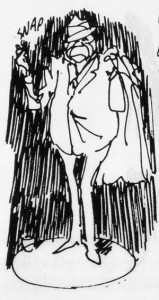 showed a mug’s face under a snap-brim hat, swaying on skinny legs and snapping his fingers:
showed a mug’s face under a snap-brim hat, swaying on skinny legs and snapping his fingers:
“I’m chairman of the Board. If some broad wantsa write a book about me… She gotta talk t’one of my boys who talks t’one of my other boys… who talks t’me. And MAYBE if the broad looks OK, I say, ‘Go Baby.’ Or Maybe I say ‘Shove it, Bimbo.’ And before she can write word one I sue her.
“So don’t give me any First Amendment crapola, I got the Frank Amendment and mine is bigger than hers. Ring a ding ding.”
After a year of litigation that cost me over $100,000 in legal fees, Sinatra finally dropped his lawsuit, but by then he had sent his message to my publisher and the rest of the world that he did not want the book written. Many people were too frightened to speak on the record, and some actually feared for their lives, but over the course of three years I managed to interview 800 people, including members of Sinatra’s family, his mistresses, co-stars, friends, neighbors, employees, FBI agents, a few antagonists, and a couple of mobsters.
In 1986 His Way: The Unauthorized Biography of Frank Sinatra was published, and– despite his threats– I lived to see the book become number one on the New York Times best seller list and sell more than 1 million copies in hardback. All very gratifying, but best of all was receiving ASJA’s Outstanding Author Award that year for “courageous writing on popular culture.”
Publication of the Frank Sinatra biography was a triumph for all non-fiction writers who struggle against immense pressure to find their way to examine the public figures who influence our society.
Thirty years ago ASJA made it possible for me to find my way– and for that I am profoundly grateful. I accept your award for Career Achievement because YOU made my career all it has been– and I thank you from the bottom of my heart.
by Kitty Kelley
ASJA Award
 The Board of the American Society of Journalists and Authors has voted to give Kitty Kelley the Founders’ Award for Career Achievement. According to Minda Zetlin, President, ASJA, “The award goes to a member whose ability to tell a story and whose style, range, and diversity of career exemplify the profession of independent nonfiction writer.” The award will be presented at a ceremony in New York on April 24, 2014.
The Board of the American Society of Journalists and Authors has voted to give Kitty Kelley the Founders’ Award for Career Achievement. According to Minda Zetlin, President, ASJA, “The award goes to a member whose ability to tell a story and whose style, range, and diversity of career exemplify the profession of independent nonfiction writer.” The award will be presented at a ceremony in New York on April 24, 2014.
Let Freedom Ring and Capturing Camelot Awards
Let Freedom Ring and Capturing Camelot both won USA Best Book awards.
More information here.
Let Freedom Ring won in the History: United States category. Read reviews of Let Freedom Ring here.
Capturing Camelot won in the Gift & Specialty Books category. Read reviews of Capturing Camelot here.
Kitty Kelley’s Capturing Camelot: Stanley Tretick’s Iconic Images of The Kennedys and Let Freedom Ring: Stanley Tretick’s Iconic Images of the March on Washington are available from Thomas Dunne Books in both hardcover and ebook formats.



